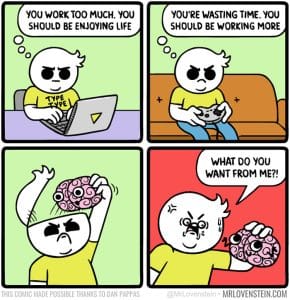Nowadays most people live according to the modern work-life division. Most work according to the 9-5 schedule and consider the remaining time outside of those hours their free time.
Everyone has a different idea of free time and how much they need it. For a student, it is the time left after their studies and homework, for an employee it is the weekend and hours after work, for a mom it is the time after the child goes to sleep, and so on.
Despite this “default” structure of the day, people still organize their time differently. As a result, everyone has different time management habits and different estimations of free time.
Why we think we don’t have enough free time
The modern day of an average person consists largely of work and after-work time. People spend most of their day working and devote the remaining time to rest, hobbies, or house chores. As a result, they have only the weekends left for personal time. Some work on the weekends too which means they have even less free time.
All these weeks then add up and sometimes comprise a lifetime.

Most of these people report not having enough free time to devote to their passions and hobbies.
While it is true that the 40-hour week may be too much and not leave enough time for personal life, it is not absolutely true. In fact, according to the US Bureau of Labor Statistics, people over 15 spend on average 2.86 hours watching TV per day. Other leisure activities take around 4-5 hours among people over 25.
Then how do some people manage to have more free time than others?
Research shows that in fact, people may have more free time than they think. The issue is how they spend it. Researchers calculated how much time is necessary for the basic things a person is required to do in everyday life, like housework and personal care. Then they compared it with the median free time of an average person.
Turns out the available free time may actually be enough.
The reason can also be the fact that some people work more than they should. In such cases, it is their choice that devours their free time. In any case, it is a good idea to take a look at your time management skills and exclude working more than is required.
How to find more free time? H2
Luckily, there are methods and tools that can help you squeeze out as much as possible from even the little free time you’ve left.
Here’s how you can have more free time.
1. Use a time tracking tool

Time trackers are a great way of organizing your time. They track your time automatically so that you don’t have to keep track of the activities you do and the time they take. They then turn the tracked data into detailed reports so that you don’t have to analyze it yourself.
If you are wondering what tracker to use, try WebWork Time Tracker. Whenever you start an activity, you can turn on the tracker and write your activity name. Then when you finish doing it, stop it, and start the next activity. In the end, you will see how much time each activity takes and adapt your time accordingly. If an activity takes more time than you think it should, next time you’ll be mindful of that.
In case you’re guilty of working overtime, you can also use WebWork at your work. It will track your time, including the platforms you work on, how much time you spend on them, and how productive you are. It records the number of your mouse clicks and keystrokes in a given time and measures productivity based on that.
Even if you have to go away from your device, you can still count on WebWork. If you’re in a meeting you can use the mobile time tracker, or you can add time manually later. In any case, your overall time is monitored so that you have an idea of where exactly it goes.
2. Create a schedule for your day

Start by writing down the activities you do during the day. Try to estimate how much each one takes. Then gradually start planning your day. Write down a to-do list the day before and try to stick to it, including the time frame you usually devote to each activity.
Some people go even further and make whole planners or bullet journals. These take time to make, so consider that too if you think of starting one.
However, if you are not an artsy person, no worries, a simple to-do list is enough. After all, you only need a visual representation of your day, nothing more.
3. Prioritize the important activities of your free time
When organizing your day, prioritize your activities. Allocate more time to those you can’t put off and do them first, such as preparing for a crucial exam for your associate’s degree in business. The other activities can wait, even if you don’t manage them that day. Remember that priorities also include time with family, friends, or just for yourself.
Time trackers help with this step too. You can see which activities take additional time and distribute those minutes to more important tasks. As a result, you’ll have a more organized day, with enough time both for work and personal life.
4. Find time wasters and deal with them

Take some time and figure out the time wasters in your routine. These can be watching YouTube in the morning, chit-chatting at work, scrolling social media, or else. This step will be much easier to carry out with a time-tracking tool. Once you find them, gradually reduce the time you spend on those activities.
5. Reduce your time spent on social media and devote it to something productive

It is no news that social media are today’s time and attention wasters. You go there to have some rest for a bit but then you look at the clock and an hour has passed. Continuous scrolling makes it harder to concentrate on the time and instead traps attention more.
Instead, learn to devote the time you spend on social media to more beneficial activities. For example, watch a documentary in the evening instead of wasting time on social media. Or start learning a new skill and watch a lesson a day. There’s so much more you can do instead of aimlessly scrolling social media.
While we’re at it, you might also want to read Top 10 Proven Ways to Improve Time Management in Your Life
6. Get rid of distractions
Let’s think about your surroundings, both at work and at home. Look around you. Do you have your phone next to you? When did you last get a notification? How much of your time did it steal?
Distractions are everywhere. At work they can be the noise, coworkers passing by, notifications, emails, and more. In case you work from home, it may be your family, kids, pets, noise again, and others.
After you figure them out, restrict their presence as much as possible. At the same time learn to concentrate on whatever you are doing and not get distracted.
You will be surprised at how much time you’ll save when there are no distractions.
7. Make sure you get enough sleep
Sleep is one of the most important aspects of one’s life that’s often overlooked. Most people devote all day to work and spend the night doing the things they didn’t manage during the day. Even though they get free time at the cost of sleep, the unhealthy results become obvious in the long run.
Because of lack of sleep, you become less productive and your overall performance starts to decline. As a result, even the little free time you have becomes useless just because you can’t function well.
Start by going to sleep early, or when you finish your errands and don’t have anything important to do. Remember to include your sleep time in your schedule as well.
Conclusion
The day of an average person is filled with time they devote to work and personal life. In this article, we looked at how much free time people have and how much they think they do. Even though people think they don’t have enough time, research shows that in fact some of them do.
Go ahead and use the abovementioned methods and tools from this article. You’ll not only find more free time but will also improve your time management skills.

